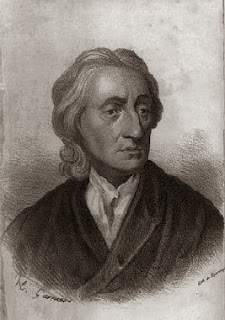A (Very) Brief Spin with the Big Three
John Locke wore many hats insomuch he was a philosopher, political theorist, and considered by many as the embodiment of bourgeois democratic revolution 1688 in which a constitutional monarch replaced the short-lived Commonwealth.
In the past, Locke studied medicine and Chemistry at Oxford. He came from a Somerset family of the minor gentry who supported the Parliamentary cause in the Civil War. Sometime later after reading Descartes, he became interested in philosophy, yet was opposed to rationalism. He was in his late 50's when his famous "Essay Concerning Human Understanding
As a philosopher, Locke had a distaste for metaphysics. He wrote to a friend about Leibniz: "You and I have had enough of this kind of fiddling." He disagreed with Plato's theory of universals, and denied any innate ideas "the mind is furnished with ideas and experiences alone."
For example, the mind of a newborn child is like a blank sheet of paper. All ideas are acquired from experience and according to Locke there are two kinds:
(1) Ideas of Sensation - Taste, smell, sound, touch, sight.
(2) Ideas of Reflection, involve the internal operations of the mind - Thinking, believing, willing.
The first ideas are simple ones of sensation, then of reflection, where the mind is essentially passive; later, the mind in an active way forms complex ideas by combining, or companing, or abstracting from simple ideas.
Locke poses the riddle of the blind man which helps in clarifying his theory. It involves a blind man from birth can distinguish a sphere and cube; suddenly given sight, can he tell the sphere from the cube without touching?
For Locke, the relationship between the idea and the object itself is in the qualities; objects have qualities which produce ideas in the mind. Locke said there were primary and secondary qualities. Primary qualities "really do exist in the bodies themselves." Secondary qualities produce ideas in the mind which aren't in the object; in this way, Locke was trying to distinguish between appearance and reality.
Locke's theory was initially derived from Newtonian physics, was to prove highly influential. He thought he had explained the origin of all our ideas, and how we come to know the world. But many disagreed with his system.
Among the first to disagree with Locke was an outstandingly lucid thinker by the name of George Berkeley.
George Berkeley
'Esse est Percipi'
The Anglo-Irish Berkeley was both don and cleric ending his days as Bishop of Cloyne. His attempt to win support for a missionary college in Bermuda failed, as did his project to convince the world of the medicinal properties of tar water in his tract Siris; It is used both as a tonic (cf. its brief appearance near the beginning of Chalres Dickens's Great Expectations) and as a substitute to get rid of "strong spirits", both of which were originally advocated by Berkeley.
According to Berkeley, Locke's theory of "qualities" was a major point of contention, and to be consistent you would have to admit all we have are "ideas," and you cannot know anything about the object itself.
Locke said abstract ideas were formed by jumping from a series of particular ideas, but Berkeley insisted that all such "abstract ideas" are really only particular ideas:
"The chair exists because I am perceiving it [...] if I leave the room the chair continues to exist because God is perceiving it [...] God perceives everything, including our perceiving minds, and thus assures their existence."
David Hume
The Problem of causation & Association of Ideas
Perhaps the most important and influential of the British empiricists was David Hume. Hume developed empiricism to its logical conclusion and basically destroyed it in the process. Born in Edinburgh of Scottish parents he became a notable literary figure and published a major History of England. He was seen as a skeptic and the leader of the Scottish Enlightenment. Among the aims of his A Treatise of Human Nature
When thinking of Hume I recall the cryptic axiom, "for everything known, therein lies the conundrum of the unknown." The rules of nature -- cause and effect -- were troubling to Hume.
Hume argues that assumptions of cause and effect between two events are not necessarily real or true -- it has happened before, that is all. It is our nature to ASSUME A CONNECTION. It is possible to deny causal connections without contradiction because causal connections are mere assumptions not subject to reason; thusly all we observe is a conjunction of events.
For example the hitting of a white and red billiard ball are separate events, occurring at separate times, and they are separate in thought. It is just a habit of the mind to assume a connection. Despite the importance of this "habit" of the mind to assume a connection, it is perfunctory, for nothing answered the point this idea of causal connection is false and fantastic.
But WAIT! Isn't this undermining induction as a scientific method, and with it most of science, as well as empiricism and any knowledge of self or outside world?!
... For everything known therein lies the conundrum of the unknown ...



No comments:
Post a Comment